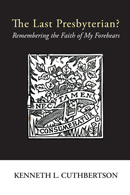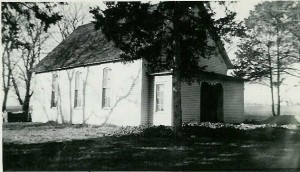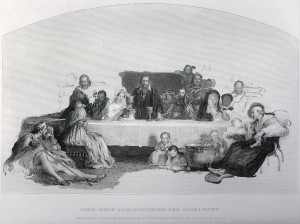The Last Presbyterian? Conversations with Ken Cuthbertson II
 Director’s Note: This week we discuss Ken Cuthbertson’s new book, The Last Presbyterian? Remembering the Faith of our Forebears (Wipf and Stock 2013). Today, the second part of my interview with him, discussing Reformed confessions, Sabbath, and the singing of Psalms, and the sacraments.
Director’s Note: This week we discuss Ken Cuthbertson’s new book, The Last Presbyterian? Remembering the Faith of our Forebears (Wipf and Stock 2013). Today, the second part of my interview with him, discussing Reformed confessions, Sabbath, and the singing of Psalms, and the sacraments.
CHR: You call Presbyterians to appreciate the Confessions. What do you see as the richness of this tradition? Why do you think it is so underappreciated, and how would you suggest we regain these treasures for living use in the life of the church?
KC: Actually, I call Presbyterians to appreciate the confessions and the catechisms, with a special emphasis for our day on A Brief Statement of Faith (1991). All of the confessions and catechisms are rich mines for reflection, showing the living witness to the Gospel in their times and circumstances. What I particularly value in the Westminster Shorter Catechism and A Brief State of Faith, however, is that they provided for regular church members a basic grounding in the core elements of our Reformed theological tradition. We need to find creative ways to better incorporate them… and other documents such as the PCUSA Study Catechism… into our worship and formational teaching.
It is understandable that the confessions, coming from very different times and circumstances and often speaking to controversies most people have never even heard of, are underappreciated. But I have found in teaching how giving just a bit of background and pointing out some basic ideas, accompanied by a few good quotes, quickly engages folks.
For us, living now, I know of no better summary of covenant theology than the middle section of A Brief Statement of Faith, and no better expression of the overall work of the Holy Spirit than its third section. The BSoF also speaks to the essential created goodness of the world and of humanity, and repeatedly affirms gender equality. If such things get sufficiently integrated into mind and heart, then believers have a good basic framework of understanding on which to build their discernments and reflections concerning the challenges facing them. “In life and in death we belong to God” and “God is faithful still” have become core affirmations in my life.
CHR: Your memories of Sabbath make for wonderful reading, and you also raise some questions about the use or need for use of Sabbath observance today and those who are hurt most by the loss of Sabbath. How do you see Sabbath observance and justice?

KC: The quotes by A.J. Heschel with which I begin that chapter are key. My interpretation is that Sabbath time is a gift of God focused on “being” rather than “doing.” Heschel refers to Sabbath as a “Temple” in time, set apart and holy. It is time that we humans all need for our physical, spiritual, and mental well-being. It is time we need together with our family, and community. Creation itself (the animals) needs Sabbath.
I think almost everyone agrees that we are too busy, not just individually but culturally. That hurts us, but (again) not just us. We become complicit in robbing others of time and energy, too often without even just compensation. (Think of sub-minimum wages paid to servers in restaurants, etc.) The working poor, in particular, are robbed of time for family and regenerative rest as both parents (or, a single parent) work multiple jobs to make ends meet… if they meet. I find it striking that in the story of the wandering in the wilderness, God gave a double portion of manna on Friday mornings to sustain the people through the Sabbath, and it did not spoil. The currently renewed push in many places for a more just and livable minimum wage is as much about time as money.
CHR: In good Presbyterian fashion you speak at length about Psalmody – the singing of the Psalms. There were many psalms included in the 1990 Presbyterian Hymnal, with a separate section included. The new Presbyterian hymnal, Glory to God, doesn’t have a separate section and is reported to have fewer psalms included. Talk about your sense of psalm singing today and how it impacts the formation of faith and ministry.
I have absolutely no desire to go back to the practice of exclusive psalmody (and no musical instruments) as is still the way of the Reformed Presbyterian (Covenanter) Church. But, as I say in the book, I would love to see Presbyterian churches become more mindful of the historic Reformed emphasis and practice of psalm-singing, and use it as a way to enrich our worship and our encounter with scripture.
Traditional Reformed psalmody is something of which far too many in the church, even in the ministry, appear to be totally unaware. I find that tragic. For earlier generations, psalmody was a distinctive spiritual discipline, a particular method of grounding in scripture that takes it… as music does… into mind and body in ways that mere words cannot. I tell a couple of illustrative stories about this in the book. The Psalms are also very creation-centered, and they unite us with the other Abrahamic faith traditions (Judaism and Islam) in ways that Christian hymns cannot.
I accept the hymnal committee’s word that their intention was to more fully integrate psalmody into Glory to God rather than isolate it. That does not mean that I agree with what they did. I am thankful that they prominently show that songs are psalms along with the title on the page, and that they included a specific psalm index.
At the recent conference in Albuquerque, at which Glory to God was being introduced, I discovered and purchased Psalms for All Seasons: A Complete Psalter for Worship. It comes to us from several entities connected to the Christian Reformed Church and, I think, the Reformed Church in America. It is wonderful!
CHR: Your chapter on the sacraments offers a lot of insight, both historical and your thoughts about current and future practice. What do you see as the future of sacramental practice in the Presbyterian Church, and if you were in charge, what would that feature?
 I will start with the admission that the one line of my family tree that was not Presbyterian was deeply and ardently rooted in the Disciples of Christ. And I treasure several aspects of that tradition.
I will start with the admission that the one line of my family tree that was not Presbyterian was deeply and ardently rooted in the Disciples of Christ. And I treasure several aspects of that tradition.
I love the line in the PCUSA Book of Order about “shunning ostentation” (F-2.05), and I think that particularly applies to worship. I value the essential framework of celebrating the sacraments derived from ecumenical practice across the centuries, but I also want that praxis to be as simple and accessible as possible. Our formal liturgies, and more Catholic-style vestments, are increasingly a bit too sacerdotal for my taste… too high church and priestly. The Reformed Tradition is different in its understanding of worship, and ministry. In a “sound-bite” world our current liturgies are often too wordy and drawn out, with the result that I think they lose rather than gain meaning for present-day people of God. Too many words – especially read ones – become a barrier rather than an access point.
Like many, I want Communion weekly, and I prefer intinction because it offers a more direct and personal encounter. I like Knox’s practice of the people being seated together at the table, the “long table” type of Communion practiced at Iona, but it is not very practical in a really large group… at least not on a regular basis. In the book I offer my thoughts on a very basic and simple order for sharing the Supper. Having grown up before children were allowed to partake, I love our current practice of welcoming them to the table… though we often need to do a better job of it. I also like the flexibility we have developed over the last fifty years vis a vis baptism (allowing families and individuals to choose among infant/child/believer baptism, either by immersion or pouring). I would like to see baptism by immersion become more readily available for those believers who want it. For infant and child baptism I like to put it at a place in the service where it is possible for all of the children to be present and, if possible, up front where they can really be part of it.
I also really want us to more deeply and fully embrace the priesthood of all believers. I understand the need for good order and understanding that lies behind our procedural rules. But I am still enough of a child of the 1970s Jesus Movement that I would value there being the possibility for a family or small group to decide to share the bread and cup without having to go get the session’s approval and have the minister there to do it. I think we can find ways to do that without unleashing chaos and superstition.

